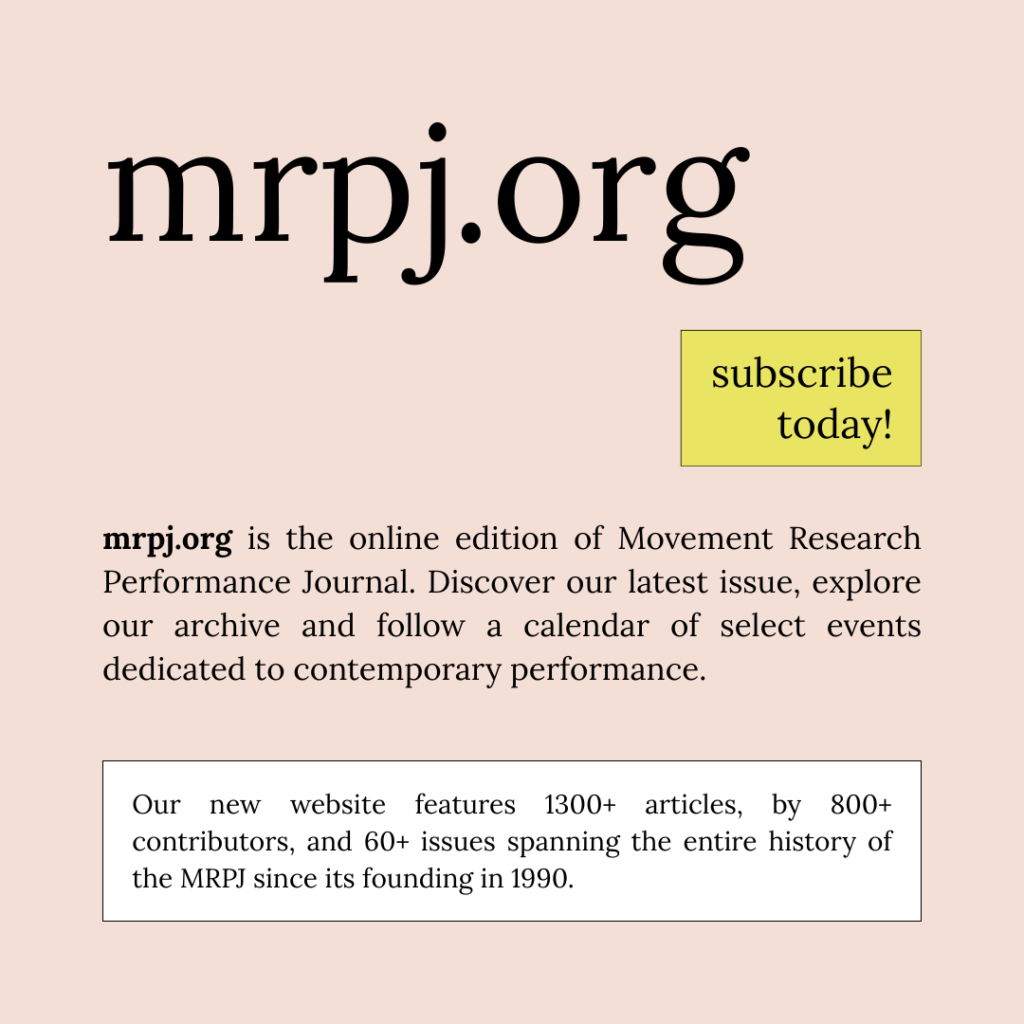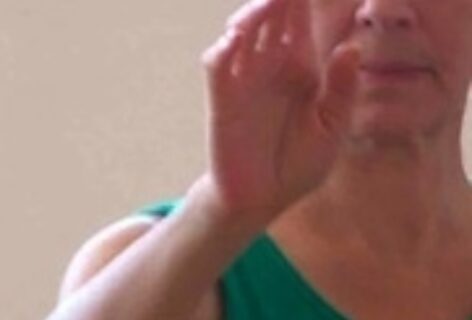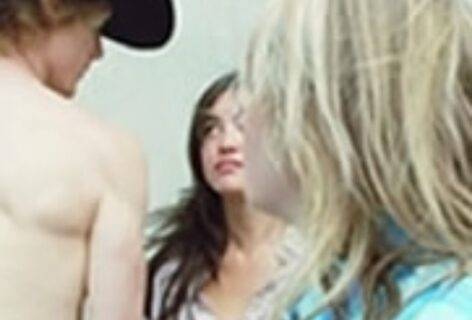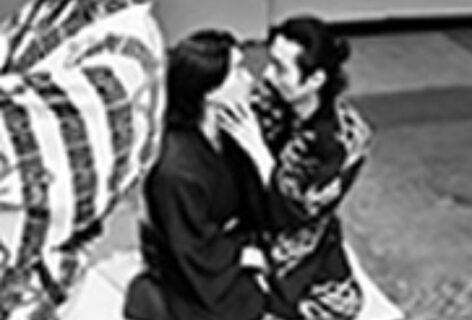Movement Research Festival 2007
Download this interview as PDF
Levi Gonzalez: Four choreographers sitting in a room! [laughter] So, I’m sitting with Isabel Lewis, Rebecca Brooks, and Beth Gill—three of the four people involved in the curation/ production group for the Movement Research Festival 2007 [Erika Hand is the fourth]. First, a simple question. How did this group form?
Rebecca: As we all know, MR had a lot of changes over the past year, so part one of the festival, which usually takes place in the winter time, happened at Danspace Project, and that was programmed by Amanda Loulaki. And then this winter we were in staff meetings at MR looking at what was going to happen, and they said, ‘hey Rebecca, let’s do a part two!’ And I was like, ‘Okay!’ We have a really small budget, and a couple of months, so I wanted to really streamline the group, not have to worry too much about getting on the same page and dealing with communication difficulties… I started out definitely still wanting to continue working with Beth in a different way—we’ve been working on making some dances—and so then Beth and I came up with Isabel and Erika. We all know each other really well, and felt like we could get it together really fast, workhorse, have some big ideas.
Levi: What are you discussing now in terms of how to approach the Festival? Especially given the amount of curatorial control that has been given over directly to artists in the last few years in terms of the format of the Festival. How are you going to approach it? Some ideas.
Isabel: I remember at one point making a list of what is a festival, so we kind of started with: is it a festival as a time capsule, a festival as a marker of time, a festival as a showcase, a festival as… all of the different things a festival can do. And we started working from there. We started thinking about different ways to approach it that maybe hadn’t been done before, or at least not in our immediate history.
Beth: I feel because of the time restrictions that we had, we spent a minimal amount of time at the beginning addressing the larger picture of the festival, in terms of structure and concept, but really…
Rebecca: But that was where we started.
Beth: We did start there, absolutely, but it’s been really helpful for us to work in a more detailed fashion, in actually trying to develop specific events. And in terms of events, we have been interested in dealing with new formats inside of the festival.
Levi: Dealing with the bigger picture through each specific event? Asking questions about each specific event and allowing that to become part of the bigger picture?
Beth: I feel weird speaking and representing the group, but it’s been very intuitive and fluid—the evolution of the festival. I think it just naturally moved into a place where we wanted to actually talk in a specific fashion about what we were going to do. And that’s how we’ve been moving forward.
Isabel: There’s this continuum that we have going on with spaces, artists and concepts. Basically, the bare bones of what a festival needs to be.
Beth: Is.
Isabel: As we secure a space, we think about what event could go there; as we think about an event, we think about what artists could kind of hit that up, or what space that artist would work well in; so, it’s been this continuum between these three pieces. But initially we had conversations, informal conversations, and started making a list of things that kept coming up. And that was the reference—
Beth: —the concepts. But I also wanted to say that we have the experience of the last two festivals, and I feel like both our personal experiences of those festivals and the materials we had, like writing and documentation of those festivals, really played a part in the consciousness of our development of this festival.
Levi: What were some of the responses to the previous festivals?
Rebecca: Isabel was part of the curatorial committee in 2004, and—
Beth: and I remember that festival well, as an audience member and as a participant.
Isabel: One of the questions that came up for us during ‘04 at the end was: in terms of the festival is more more? Or is less more? And in a way there were two camps at the time. Some people felt that less would have been better instead of such a jam-packed festival. But, at the time, I had felt that more is more when it comes to a festival. When I think of festival, I think of access to a lot of information in a very concentrated amount of time.
Beth: That question keeps coming up, just the other night it came up again, and somebody felt like less is more, and we were ‘hmmm…I don’t know…’ I go back and forth too.
Isabel: When we started doing this, which was… what?
Rebecca: March.
Isabel: Because we have so little time, it’s almost like the effort for more is more is kind of…
Beth: I’m coming to the realization that…
Rebecca: …we may end up having less.
Beth: Yeah.
Rebecca [or Isabel?]: …even though we are trying for more.
Beth: It’s kind of out of our hands almost.
Levi: It almost reminds me of making a piece. That there’s this sense that there is an abstract always, but really how it evolves is by figuring out the concrete.
Rebecca: Yeah. I feel like we’re in a place where we’re dealing with this continuum and trying to get stuff happening, and now tonight, in our meeting following this interview, I’m interested in checking in with what we actually have on our schedule—stepping back and looking at ‘what is here now.’
Beth: Right.
Rebecca: Just like making a piece, you’re in it, you step back, you’re in it, you step back, you figure out what actually has happened here, what actually do I see.
Beth: Yeah, it’s pretty amazing in the way I feel like any collaboration is really incredible. You put ideas out there and you take on responsibility and somehow the combined effort of that action produces things. That’s been inspiring, especially inside of this group.
Levi: I want to ask—I’m going to pull away from the specifics of the festival—and this is just a general question. What do you think artists can provide as curators, as opposed to a presenter or a more traditional form of curatorship? Very open, semi-loaded question. It doesn’t have to be a combative response.
Isabel: Well, I think there’s something to being engaged in the form daily as an art-maker. I think that is going to give you a certain perspective that not engaging in a daily practice of creating and being amongst your community—that would be a different perspective.
Beth: I think you’re closer to the sort of heart beat of the community or something like that, so that you have a better sense of—I shouldn’t be using words with those kinds of values attached to them, but—I feel like maybe you have a better sense of what is needed or wanted, especially wanted, maybe…
Levi: Within the dance community? Or,
Beth: Yeah.
Rebecca: It’s also like, what do I want?
Beth: Yeah, sure.
Rebecca: What do I want to see? What am I interested in?
Beth: I guess I’m going on the assumption that my desires must be related somehow to the desires of the community.
Rebecca: Right. Because you’re an active participant, you can make that assumption.
Levi: I wonder if there’s a freedom with artists to be able to ask that question, ‘what do I want?’ as opposed to a presenter who has other responsibilities.
Rebecca: Yeah, we have very few strings attached to this festival. We have a few grant responsibilities to fulfill, but really, it’s very open for us, and that’s really awesome.
Levi: One of the things that I think is exciting about artist-curating that seems to be happening a lot right now is that thing that they’re not going to play the middle ground in terms of, ‘let me get a little of this, a little of this, a little of this. I really want to support this younger artist, but I have to bring on these people that I’ve been presenting for a long time.’ But because it’s a temporary position, because you’re putting your subjectivity stamp on it as a curator, you can push for specific agendas. Has that been able to happen so far, do you think?
Rebecca: We’ve definitely addressed that. In the beginning we started making lists of spaces and larger ideas, and we also made some lists of people, and I feel like in our minds somewhere we are paying attention to people who identify as MR artists.
Beth: I feel like the effort on our part is actually the opposite of what you’re describing, because there’s a lot of similarity among the people in this group in particular, so I think we’re striving to remind ourselves of the middle ground to keep perspective on a larger focus. But I think, in general, that is the power in having also a single artist curate an evening. I feel like there’s a difference between an artist curating an evening for a venue and a group curating a festival. They’re different events, so they do have different needs in reaching a certain community. That sounds really vague, but…
Rebecca: We are partnering with other artists, also, for those individual events. So, it’s not like we ourselves are curating each evening.
Isabel: I feel like it has a relationship to that thing of reverence and irreverence that has kept coming up at our meetings. What is, or what do we perceive to be our responsibilities, and to what extent is it interesting or helpful to take notice of that, and to what extent can you just say, fuck it. You know?
Levi and Beth: Yeah.
Beth: You know, I will say, as a dance community member, it means something to me a lot of the time when I look at whatever season brochure of whatever venue and I see this person, curated by this person. It’s like, there’s a thing there.
Levi: An extra meaning attached to it.
Beth: Yeah.
Levi: An artist sort of saying,
Beth: ‘I vouch for this person.’
Levi: That’s what’s going to be seen more, and something about the way the festival used to be run when it was the Improv Festival… Even though basically Amanda was programming it, it still didn’t have the same sense of name-attachment. There’s something about the institution that depersonalizes it. And now it’s like, ‘oh, you are the festival.’ Which isn’t to say that, ‘we can do whatever we want,’ Of course you feel some responsibility…
Beth: Sure.
Levi: …but that there is a certain intimate connection.
Isabel: Yeah, absolutely, and I feel like what’s essential to that is that it is a different team every year. I feel like that is the crucial link—that it’s going to be a completely different team and a completely different model.
Rebecca: Exactly. 2004 was pretty multi-generational. 2005 was four people coming from pretty different places, so they were trying these different models and seeing what will happen. And we have the freedom to do that.
Levi: That brings up another question, which is a common question that arises with MR-related issues. This idea of the generation that started MR that I feel these days sometimes feels disserved by MR. All of you being, we decided “generation” isn’t a good term, but for lack of a better term right now, “a younger generation” group of artists, how to address these other groups of artists who may be in their thirties or forties?
Rebecca: Or sixties or seventies.
Levi: Or sixties or seventies, totally.
Beth: I don’t know how I reach them, but I feel like in the effort to do so, it’s an education for me. I really feel like what is going on right now, I see it in terms of what it’s doing for me. I don’t know what it’s doing for other people, but I feel like this is a really educational process for me. And somehow that’s related to the awareness that there are generations above me that have a lot of knowledge. That was a really vague statement, I’m sorry.
Levi: No, I like that. Ultimately, it’s a process, too, right? Just like anything else. And you can only start from where your perspective is and then branch out from there.
Beth: I mean, this could be maybe a troublesome thing to say, but I think there’s danger in any institution when it becomes restricted by its efforts to, um, to…[Levi interjects something] don’t finish my sentence! I’ll finish it!
Levi: I’m getting excited. [laughter]
Beth: I feel like there’s a lot of effort that’s put into sustaining and preserving institutions, and there’s a way that those efforts can end up hindering the institution over time, and I think it’s important to allow for change and evolution. I’m not taking responsibility for change or evolution, and I don’t know whether that’s actually happening to MR, but as a broad statement, I do feel that way about institutions in general.
Levi: Yeah. It’s not change or evolution if you take responsibility for it, because then it goes into that same dynamic that you’re talking about.
Beth: Yeah, what an organization is is really held together by the fabric of people and the community. That is a really fluid, shifting thing, you know. I don’t think you can really control that.
Rebecca: Process and questioning and research.
Isabel: I mean, MR still seems like it has so few resources. I don’t know that that’s the place where you go as an established artist in our career. I’m not sure if MR has what it takes to be like, ‘I can support you in this certain kind of way.’ It supports so much, and it supports so much thinking. I’m not sure that it has the capacity to serve in the way that… just in terms of financially or….
Rebecca: It’s surprising though, in the past few years, the artists who apply for things at MR. I’m continually surprised by the level of people who I feel are so… I don’t know… huge, more established or, you know, really awesome artists continue to come back to MR really knowing that there are no funds, but knowing that there’s something else.
Isabel: See, that makes sense to me. I mean, in that way, I guess I would wonder how are people disserved by this institution, which seems to just kind of give all it has—
Levi: It also speaks to how finite the resources are.
Isabel: Right, exactly.
Levi: For how many artists there are living here.
Rebecca: It’s kind of a sad thing.
Levi: It is. I want to ask one more question. I just really related to what we were saying, which is this idea of institutionalization, because in my experience I feel like the art world in general—and also the dance world, though it tends to be a little behind the others in this way—is getting more and more institutionalized.
Rebecca: The dance world?
Levi: The dance world. But I think the art world in general is getting more and more professionalized, more and more institutionalized, and dance being part of the art world is also experiencing this trend in its own way. And I was just wondering about that, and does that influence at all the way you are thinking about structuring the festival, or your thoughts about what curation or production means. Pretty open.
Beth: I just want to make a statement about the beginning half of that. I just went and listened to this lecture at MoMA the other day on avant-garde art movements from like 1960s forward. It was basically like Art History 101, and I left feeling that even what I think is the avant-garde here in NYC still has to operate somehow within the sort of structure that you’re talking about, and relate itself to the larger world or the outside world. And wondering what is it about time, and about the current place that we’re at now that an underground is actually really hard to preserve, or whatnot. So that’s a little different.
Levi: No, it’s totally related.
Beth: And I don’t really have ideas about that; I mostly just had a feeling. I left and I felt kind of solemn or something. I feel like there’s always been a desire or wish in me to feel more removed from that, and I feel more resigned lately that I need to actually be “established”—yeah—and I’m doing it. I feel that as a choreographer I’m really working to create more “professionalism,” almost, in my lifestyle and what I do surrounding my work and my choreography. Those demands that I feel have really evolved out of just participating and learning that. Anyway, I don’t really know how that’s affected our discussions. I don’t feel its effects so much in terms of our meetings for…
Levi: …for the festival.
Beth: Yeah. I feel a lot of freedom inside of this process, so I don’t actually feel…
Isabel: No, I don’t feel it so much here; I don’t feel MR as an institution—
Beth: —in that way. I feel like MR is really different, yeah.
Isabel: I don’t feel like I really think about that, or it always seems like it’s so transitory and delicate and shifting and that we’re just another fluid shifting thing inside of it working to create this festival. I feel like I have a lot of feelings of frustration in relation to that, and confusion of neatly packaging or neatly defining, all of those things really confuse me. And I was like, ‘oh, I made a website,’ and now I want to see it organized, and I want people to be able to read it, and I want people to have access to my information…
Beth: Some of it I feel really evolves out of personal needs that I have to be able to function in my life, and some of that organization really creates stability and movement for me. I can feel more free to do what I need to do.
Levi: It’s like that “limitation creates freedom” sort-of-rule.
Beth: Right.
Levi: But also what you were saying before about the institutionalization of things can sometimes create a lockdown, so it’s that fine line. I mean, we’re obviously part of the system, right? I don’t know that you can exist outside of it, so how do you operate in that space?
Beth: And especially for performing… I don’t know! I guess all art has to deal with the way it addresses its public, or “the public,” and I feel like it’s in that effort a lot of the time, and that all of the sort of institutionalizing starts to happen… whatever. And it’s the dangerous thing, too. When I walked out of that lecture series, I was also really aware that I had just watched how many years of history condensed into an hour and half time period, so it was going to be presented in this really concise and clear way. But there was so much energy involved in some of these movements that they were talking about. And I wanted to feel that, that kind of energy inside of me and what I do. And the community I’m a part of without feeling the sense of calculation that can sometimes becomes a real part of it. You know?
Levi: Sure. Maybe the festival will help do that!
Beth: I just want to throw this in there: my first memory of the MR festival was the ’04 festival, and I was hugely inspired by that festival as an individual. And I really did feel this kind of energy. So, maybe it can happen.





